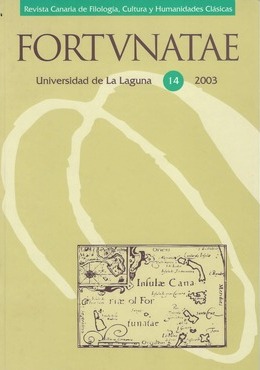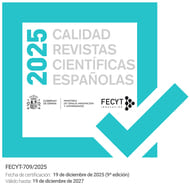Saber y conocer en las tragedias de Sófocles: Introducción a un estudio léxico
Resumen
La cuestión del conocimiento humano tuvo en los siglos V y IV a. C. una gran importancia desde distintos planos. Así, vemos cómo se debate sobre ella en varias tragedias sofocleas, cómo los sofistas se ocuparon de precisar el debate dentro de los límites humanos, o cómo Platón reflexiona sobre ella en sus diálogos. En esta ocasión el autor se ocupa de la obra de Sófocles, de la que analiza sólo dos términos, y anuncia que el estudio habrá de continuar con la extensión del análisis a un campo léxico mayor.
Citas
ALAMILLO, A. (1981): Sófocles. Tragedias, Madrid, Gredos, BCG n.º 40.
BENAVENTE BARREDA, M. (1999): Sófocles. Tragedias y fragmentos, Madrid, Ediciones Clásicas.
BERNIDAKI-ALDOUS, E. A. (1985): Blindness in a culture of light, especially the case of the Oedipus at Colonus of Sophocles, J. Hoptkins Univ., Baltimore.
BOWMAN, L. (1994): Knowledge and profecy in Sophokles, Diss. Univ. of California, Los Ángeles. (DA, 1994-5, 55[9], 2815A; = Univ. Microf. Int., Ann Arbor, Michigan, n.º 9504504).
BRUNSCHWIG, J.-LLOYD, G.-PELLEGRIN, P. (2000): El saber griego. Diccionario crítico, Madrid, Akal, [Original francés de 1996].
BUTAYE, D. B. (1980): «Sagesse et bonheur dans les tragédies de Sophocle», LEC XLVIII, 289-308.
BUXTON, R. G. A. (1980): «Blindness and Limits; Sophokles and the Logic of Myth», JHS 100, 22-37.
CHAMPLIN, M. W. (1969): «Oedipus Tyrannus and the problem of Knowledge», CJ LXIV, 337-345.
COUGHANOWR, E. (1997): «Philosophic meaning in Sophocles’ Oedipus Rex», AC 66, 55-74.
DALE, A. M. (1956): «Seen and Unseen on the Greek Stage», WS 69, 96-106.
DILLER, H. (1950): Göttliches und menschliches Wissen bei Sophokles, Kieler Universitätsreden, Heft 1.
DREXLER, H. (1956): «Die Teiresias-Szene des König Oedipus», Maia VIII, pp. 3-26.
ELLENDT, F. (19652): Lexicon Sophocleum, Olms, Hildesheim, edic. de H. Genthe. (Berlin, 18721).
ERRANDONEA, I. (1959, 1965, 1968): Sófocles. Tragedias, 3 vols., Barcelona, Alma Mater.
FLORENSKAJA, T. A. (1978): «La catharsis en tant que prise de conscience: (L’Oedipe de Sophocle et l’Oedipe de Freud)», L’inconscient, nature, fonctions, méthodes d’étude, II (Tbilisi Mecniereba), 562-570.
FOWLER, B. H. (1981): «Thought and underthought in three Sophoclean plays», Eranos LXXIX, 1-22.
GIANGRANDE, L. (1983): «Self-knowledge», CEA XV, 61-67.
GROSS, N. P. (1982): «Antigone and archaic thought. A reading of the Antigone», Selecta (Corvallis, OR; Oregon State Univ., Pacific Northwest Council on Foreing Lang.) III, 17-25.
HESTER, A. D. (1971): «The ignorance of Oedipus», Prudentia, 1993, 25.1, 1-23; «Sophocles the unphilosophical. A study in the Antigone», Mnemosyne XXIV, 11-59.
INNAMORATI, M. (1995): «Innocenza di Edipo...», QUCC 49, 161-172.
JARKHO, V. N. (1969): «Zum Problem des Wissens in der sophokleischen Tragödie», Das Altertum, 1970, XVI, 89-96; «La crise de la raison dans la tragédie attique comme reflet de la crise de la polis athenienne», en Die Krise der griechischen Polis, 29-33.
JOUANNA, J. (1997): «Sophocle, Ajax, v. 747: le savoir du devin ou le savoir du messager?», REG, 1991, CIV, 556-563; «Oracles et devins chez Sophocle», en J.-G. Heintz (ed.), Oracles et prophéties dans l’antiquité. Actes du Colloque de Strasbourg (15-17/VI/1995), Paris, 283-320.
KANE, R. L. (1975): «Profecy and perception in the Oedipus Rex», TAPhA CV, 189-208.
KITZINGER, R. (1993): «What do you know? The end of Oedipus» en R. M. Rosen/J. Farrell (eds.), Nomodeiktes. Greek Studies in honor of M. Ostwald, Univ. of Michigan Press, Ann Arbor, 539-556.
KURTZ, J. G. (1984): Some observations about the dianoia of the Chorus in Sophocles’ Theban plays, Univ. de Boston.
LAHMER, K. (1984): «Wahnsinn und Wissen als dominantes Strukturmerkmal im Aias des Sophokles», SIFC II, 174-192.
LEFÈVRE, E. (1987): «Die Unfähigkeit sich zu erkennen. Unzeitgemässe Bemerkungen zu Sophokles’ Oidipus Tyrannos», WJA XIII, 37-58.
LEFÈVRE, E. (1990): «Die Unfähigkeit sich zu erkennen. Unzeitgemässe Bemerkungen zu Sophokles’ Trachiniai», WJA, XVI, 43-62.
LEFÉVRE, E. (1991): «Die Unfähigkeit sich zu erkennen. Unzeitgemässe Bemerkungen zu Sophokles’ Aias», WJA XVII, 91-117.
LEFÈVRE. E. (1992): «Die Unfähigkeit sich zu erkennen. Unzeitgemässe Bemerkungen zu Sophokles’ Antigone», WJA XVIII, N. F., 89-123.
LEFÈVRE, E. (1993): «Die Unfähigkeit sich zu erkennen. Unzeitgemässe Bemerkungen zu Sophokles’ Elektra», WJA XIX, 19-46.
LEVIN, S. (1971): «Know thyself. Inner compulsions uncovered by oracles», Fons perennis. Saggi critici di filologia classica raccolti in onore di V. d’Agostino, RSC, Turín.
LONG, A. A. (1968): Language and thought in Sophocles. A study of abstract nouns and poetic technique, Londres, Athlone Pr.
NEWTON, R. M. (1975, 1995r): Oedipus and the ways of knowing, Univ. de Michigan, Ann Arbor.
ORTEGA Y GASSET, J. (1983, 1994r): Obras completas, 12 vols, Madrid, Alianza Editorial/Revista de Occidente. O’SULLIVAN, G. F. (1973): «Reflections of rationalism in Greek Tragedy», CF XXVII, 54-61.
PALLÍ BONET, J. (1988): Sófocles. Tragedias completas, Barcelona, Ediciones B.
PEARSON, A. C. (1924): Sophoclis fabulae, Oxford Classical Text (1967r).
RÁBADE ROMEO, SERGIO (20033): Obras. I: El conocimiento humano 1, Madrid, editorial Trotta (edición de J. A. Martínez Martínez y J. García García) (19691; 19852).
ROSELLI, A. (1982): «Livelli del conoscere nelle Trachinie di Sofocle», MD VII, 9-38.
SEGAL, CH. (1986): «Time, theater and knowledge in the tragedy of Oedipus» en B. Gentili/R. Pretagostini (eds.), Edipo. Il teatro greco e la cultura europea. Atti del convegno internazionale. Urbino, 15-18/IX/1982, Roma, Ed. dell’ Ateneo, 459-484 y 485-489.
SEGAL, CH. (1994): «Sophocles’ Oedipus tyrannus: Freud, language, and the unconscious» en P. L. Rudnytsky / E. H. Spitz (eds.), Freud and forbidden knowledge, New York University Press, 72-95.
SHELTON, J. A. (1984): «Human Knowledge and self-deception. Creon as the central character of Sophocles’ Antigone», Ramus XIII, 102-123.
STANFORD, W. B. (1978): «Light and Darkness in Sophocles’ Ajax», Greek Roman and Byzantine Studies 19, 189-197.
TAAFFE, L. K. (1986): «Knowing his place: Sophocles’ Oedipus at Colonus, 668-719» en K. V. Hartigan, Within the dramatic spectrum, Univ. Florida, 213-219.
VARA DONADO, J. (1985): Sófocles. Tragedias completas, Madrid, Cátedra.
WEBSTER, T. B. L. (1969): An Introduction to Sophocles, Londres, Methuen & Co. Espec. pp. 18-55.
Los autores conservan los derechos de autor y garantizan a la revista el derecho de ser la primera publicación del trabajo al igual que licenciarlo bajo una Creative Commons Attribution License que permite a otros compartir el trabajo con un reconocimiento de la autoría del trabajo y la publicación inicial en esta revista.
Los autores pueden establecer por separado acuerdos adicionales para la distribución no exclusiva de la versión de la obra publicada en la revista (por ejemplo, situarlo en un repositorio institucional o publicarlo en un libro), con un reconocimiento de su publicación inicial en esta revista.






